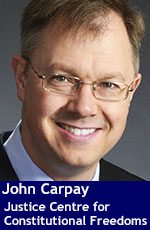 Alberta Health Minister Sarah Hoffman recently claimed that banning peaceful anti-abortion protests near abortion clinics is not about freedom of expression. Yet she has also expressed confidence that her new law would withstand a constitutional challenge.
Alberta Health Minister Sarah Hoffman recently claimed that banning peaceful anti-abortion protests near abortion clinics is not about freedom of expression. Yet she has also expressed confidence that her new law would withstand a constitutional challenge.
By speaking of a constitutional challenge, it seems that she knows that this new law tramples on free expression as protected by Canada’s Charter of Rights and Freedoms.
It’s not easy to make a case against peaceful expression on a public sidewalk. So the minister, along with Edmonton and Calgary abortion clinic managers, refer to a collection of illegal and potentially illegal behaviours: “aggression, threats, yelling, screaming, interference, bullying, intimidation, harassment, shaming and blocking access.” Perhaps these examples of illegal behaviour will distract people from the prohibition on Charter-protected expression.
It is a criminal assault to push, shove, hit or punch someone, or even touch someone without consent. Uttering threats to harm a person’s life, body or property is also criminal. Disturbing the peace by yelling and screaming is criminal, and also contrary to municipal noise bylaws.
Criminal Code Section 430 makes it illegal to “obstruct, interrupt, or interfere with the lawful use, enjoyment or operation of property.” It’s criminal to block access to someone going about their business and engaging in legal activities (which includes getting an abortion). All of these actions could be characterized as aggression, which is illegal, along with interference, threats, yelling, screaming and blocking access.
But what about bullying, intimidation, shaming and harassment? Intimidation caused by physical blocking, interference or obstruction is already illegal.
Intimidation caused by threats is also already illegal. An environmentalist protester can’t tell a logger: “Chop down that tree and I will chop you down.” But threatening some form of moral consequences or psychological harm (e.g. “you are on the wrong side of history,” “karma will repay you for harming Mother Earth” or “your lust for profits is killing the forest”) is perfectly legal.
Intimidation caused by someone criticizing your behaviour is part of living in a free country. How can citizens debate a topic (pipelines, climate change, Donald Trump’s presidency) without referring – directly or indirectly – to standards of good and evil? In contrast to theocratic Iran and communist North Korea, free societies don’t dictate the correct answers to difficult questions.
An oil company executive might feel intimidated when confronted on a public sidewalk by Greenpeace protesters, who she can’t avoid seeing and hearing on her way into her office building. But as long as environmentalists threaten no harm to her life or property, and do not physically obstruct her access to her office, any discomfort she may feel is simply part of living in a free country.
In a free society, nobody can be exempt from having her or his actions criticized as immoral by others. Witness the predictable litany of judgment cast by social justice warriors: racist, sexist, homophobic, transphobic, etc. Should governments pass laws to create ‘safe’ zones where no person will hear such words?
What holds true for intimidation also holds true for bullying, shaming and harassment. Feelings of being bullied, shamed and harassed are normal in a free country, and to be expected, absent physical interference or threats of harm. All Canadians have a right to denounce conduct they believe to be wrong. People exercise this right every day on blogs and Facebook and Twitter and elsewhere, denouncing what they see as political, economic or environmental injustice.
Whenever citizens exercise this right to speak out against actions they believe to be unjust, this will necessarily offend those who carry out such actions. Feeling offended is the price we pay for living in a free country.
Alberta’s proposed law is about government deciding that the ‘wrong’ opinion can’t be expressed peacefully on a public sidewalk, just because some people feel very offended by this opinion.
Under the pretence of stopping already illegal behaviour, this law targets the heart of constitutionally protected expression. This law should therefore be resisted and rejected by all who cherish free society, pro-choice and anti-abortion people alike.
Calgary lawyer John Carpay is president of the Justice Centre for Constitutional Freedoms.
The views, opinions and positions expressed by columnists and contributors are the author’s alone. They do not inherently or expressly reflect the views, opinions and/or positions of our publication.

